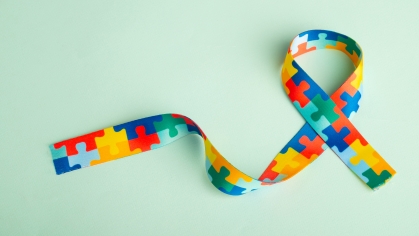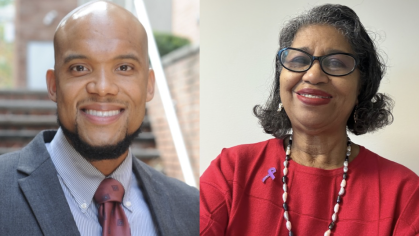April 12 is National Day of Silence. Dr. Gabriel Robles, Assistant Professor & Chancellor's Scholar for Inclusive Excellence in Sexual and Gender Minority Health, explains what this day means to him and shares ideas for social workers to better support LGBTQ+ individuals.
Tell us a bit about your journey to social work.
In my statistics class in the Education Department at my university, I started noticing how much we focused on standardized tests. This got me thinking about broader issues like health and well-being, especially since I was working at the YMCA and saw the real-world impact of community programs. I brought this up with my professor, suggesting we could look at different kinds of situations in class. We talked about my interests and career goals. She recommended I investigate social work programs, saying they might align more with my interests.
Then, a few days later, a real-life example walked through my door at the YMCA. A school staff member referred a kid to me because they said he was being difficult. After spending some time with him, I did not see any behavioral issues explicitly. At the end of our session, while cleaning up the toys, I decided to lighten the mood by putting on a silly hat and a piece of oversized plastic jewelry. This sparked a question from him, asking if it was okay for boys to play with such things. I assured him, "Of course, you can play with whatever makes you happy, as long as you're not hurting anyone." His response, "Good, because I really want to be a princess," struck a chord with me. It was a reminder of the struggles some kids face just being themselves. That experience solidified my decision to pursue a graduate degree in social work. It highlighted the importance of supporting individual expression and the role of communities in fostering acceptance and well-being.
What is the significance of the Day of Silence for you?
The Day of Silence is a way of showing support and raising awareness about the challenges LGBTQ+ students face, like bullying and feeling left out. It is a day to think about how important it is to make schools welcoming for everyone, no matter who they love or how they identify. This day reminds us that LGBTQ+ people are still fighting for fairness and how much work we need to do to stop discrimination and encourage equality. It is a time to remember to be kind, respectful, and open-minded, showing that staying quiet can make a big statement in battling unfairness.
This day also highlights how crucial it is for everyone to support LGBTQ+ communities actively. By joining in on the Day of Silence, people show they are ready to stand with those who have been ignored and to fight for a place where everyone's voice matters. It is a chance to look inward at how we treat LGBTQ+ folks and think about how we can make things better and more welcoming for everyone. The Day of Silence isn't just about not talking; it's about sparking real change.
How can the social work community recognize and commemorate the Day of Silence?
Social workers can make a difference on the Day of Silence by getting involved and spreading the word in schools and around the community. They can hold talks and workshops to teach about what LGBTQ+ students go through and offer tips on how to support and stand up for them. They can also set up safe spaces where students can discuss their own experiences and feel understood. By making sure LGBTQ+ voices are heard and showing how important the Day of Silence is, social workers can help make everyone more welcoming and respectful.
Also, social workers can team up with schools, families, and local groups to plan events that mark the Day of Silence and draw attention to supporting LGBTQ+ kids. This could be things like silent walks, candlelight vigils, or art shows that capture the ideas of being silent but also speaking out. By doing these kinds of activities, social workers can help connect different parts of the community, sparking conversations and bringing people together not just for one day but for the long run. Getting involved in the Day of Silence like this shows that social workers are all about fairness and looking out for everyone's well-being.
What can the social work profession or social workers do to continue to support the importance for individuals for the Day of Silence beyond this month?
To make the Day of Silence count for more, social workers can keep pushing for policies that make schools safer and more welcoming for LGBTQ+ students. This means working with schools to include everyone in the lessons they teach, to stand against bullying, and to make sure teachers know how to support LGBTQ+ students. Making schools a place where everyone can feel safe helps tackle the problems that the Day of Silence points out. Social workers can also offer extra help and provide support directly to LGBTQ+ students and their families, helping them deal with issues like feeling accepted and dealing with unfair treatment.
Social workers can also keep the conversation about LGBTQ+ rights and acceptance going all year round, not just on the Day of Silence. They can do this by setting up events, support groups, and campaigns that keep people talking and learning about these important issues. By building a community that gets behind diversity and stands up to discrimination, social workers can help create a more respectful and understanding atmosphere. Keeping up with education, spreading awareness, and advocating for change are key to making sure the Day of Silence starts real, lasting change for LGBTQ+ folks.
This story was created in partnership with Rutgers School of Social Work's Inclusion, Intersectionality, Diversity, Equity, and Advancement (IIDEA) Committee.



